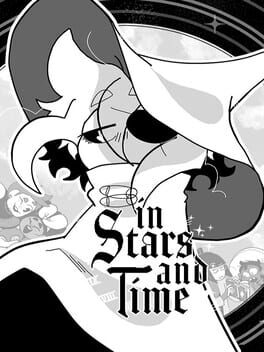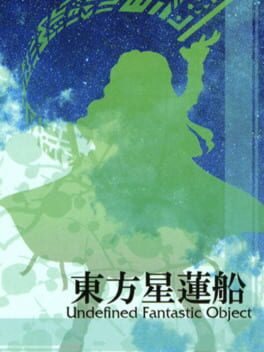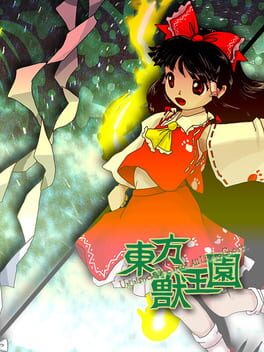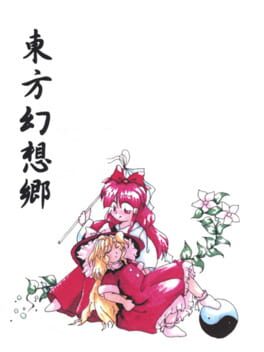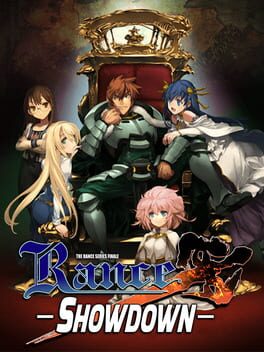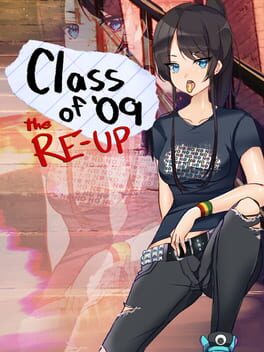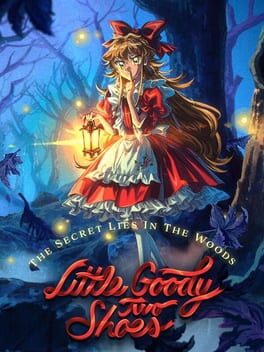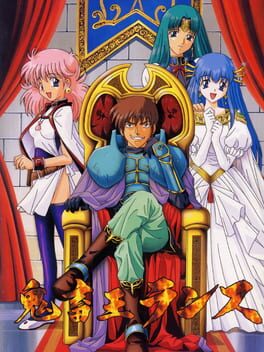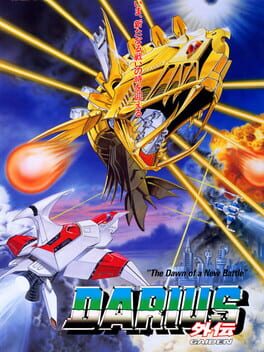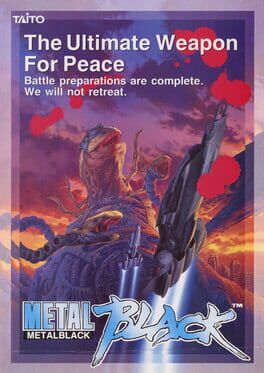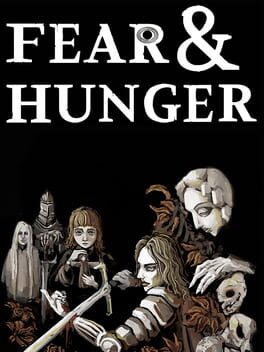NoArrows
2023
This review contains spoilers
I appreciate how gay and online this is as someone who's also those things and it's cute enough. I don't know that the time loop gimmick did much mechanically except induce frustration, which was clearly intentional but I don't know if that excuses it. It did undeniably make me feel what Siffrin felt though.
What really bothers me the most though is that the combination of intensely self-loathing protagonist and unbelievably accepting and ideal friends comes across to me as an unintentionally narcissistic fantasy. Mirabelle allegedly struggles with anxiety as well, but while this never seems to manifest in a way that really hinders anyone, Siffrin's issues are so immense that they trap everyone in an endless recursion of time, for which the solution is his friends' uncritical love for him. I would have been much more positive on this if it had ended differently, but this isn't nearly as thoughtful as a story of this nature ought to be. In retrospect I have similar thoughts about Omori and have to wonder if there's something about these indie RPGs that results in these stories, or if this took inspiration from that.
What really bothers me the most though is that the combination of intensely self-loathing protagonist and unbelievably accepting and ideal friends comes across to me as an unintentionally narcissistic fantasy. Mirabelle allegedly struggles with anxiety as well, but while this never seems to manifest in a way that really hinders anyone, Siffrin's issues are so immense that they trap everyone in an endless recursion of time, for which the solution is his friends' uncritical love for him. I would have been much more positive on this if it had ended differently, but this isn't nearly as thoughtful as a story of this nature ought to be. In retrospect I have similar thoughts about Omori and have to wonder if there's something about these indie RPGs that results in these stories, or if this took inspiration from that.
People seem real mad because bad about this one here. Ichirin and Murasa are some of the coolest bosses in the series but they're all pretty good, even Nazrin. You can pretty quickly max your lives with the red UFOs too, so I don't really think it's that hard. I imagine trying to continue at the final two stages is difficult, so maybe it feels worse if you don't play to 1cc these games as a matter of course.
This Twinkle Star Sprites style of Touhou always loses the cool bullet patterns instrumental to making Touhou good and doesn't really replace it with anything that'd make me want to play this over Twinkle Star Sprites. I only did a run as Reimu, but it just feels like a really easy and unremarkable shmup.
2018
This review contains spoilers
I played this game on release after greatly anticipating it and following the series for years at that point. Of all the things that could be said about it, what's really most remarkable I guess is that it exists and it doesn't suck. The only similar long-running RPG series with a continuous story I can think of is Trails, and my interest in that precipitously declined when they got to Cold Steel, so Rance running for thirty years and ending relatively well was unprecedented and I don't know if it'll ever happen again.
I was very positive on it at the time, probably amplified by the high that comes from reaching the end of something so long. Rance X itself is a ludicrously long game, to say nothing of the series itself. But there are problems here, and by now I don't really think this outdoes Kichikuou.
Part II in concept is a great twist and I was floored when I first reached it (thankfully unspoiled), but honestly, I barely remember what happens in most of it and it ends with literal deus ex machina. It's cute playing as Rance's kids and I like the Toushin Toshi quest for the nostalgia, but little of consequence happens until you finish collecting the Dragon Quest orbs and go to fight Rance.
I understand of course that by this point the game has mostly stopped concerning itself with the events of this world and a lot of this is metatextual. I love that the game completely stops being a porn game now that Rance isn't present and only starts being one again in a couple of instances when he is, that's pretty clever and I kind of can't believe they did it. And at the very end they just spell out that the intention of all of Part II is to show "God" (the player) that perpetuating the suffering of this world (continuing to draw out the series) is not the greatest joy that can be experienced, and instead you can Collect Orbs and Fight the Demon Lord (play Dragon Quest? But who knows how much longer that's going either with Toriyama dead.)
Nice idea, but you kind of fucked it up because Part II is not nearly as fun as Part I or most of the rest of the series when taken by itself. It's Part I but far more linear and limited, and the lack of dramatic conflict amongst the characters outside their immediate goal of fighting Rance doesn't give them much depth. Maybe this is me being a huge masochist as I certainly am, but I do enjoy a little suffering, and I can't say this story convinced me to not enjoy it. And the depiction of suffering had already been greatly reduced by this point in the series anyway outside of scenes like designated Bad Ending gratuitous rape scenes and such you go out of your way for, which makes it feel especially fetishistic and not very real.
In Kichikuou the perpetuation of suffering was an inevitability and the greatest possible ending was to delay further conflict until after Rance would likely be dead. This is a much more realistic outlook, but I understand wanting to do something different and I'm glad they didn't just go with a Kill God ending given how impossible that's been established to be and how little it would mean narratively as anything but a power fantasy. But while I respect the attempt I don't think it actually lands.
I haven't even talked about Part I, but the problem with Part I narratively is that it's all what you would expect from the buildup across the previous games. This is The War with Kayblis, Kichikuou already did this but far more succinctly. In some ways this is better and in some ways that was better, but it has been done and reaches the same conclusion, so only what happens afterward can be that novel. Mechanically it's more open-ended than Part II, but not nearly as open as Kichikuou could be, and the character events have again been greatly watered down from what they were in that.
Anyway it is good and in some ways remarkable, I won't deny that. But I don't know if this is really the ideal ending that it could have been. I don't know if that ever could've happened after the main writer changed after Sengoku Rance either; the games from Rance Quest on don't quite feel right.
I was very positive on it at the time, probably amplified by the high that comes from reaching the end of something so long. Rance X itself is a ludicrously long game, to say nothing of the series itself. But there are problems here, and by now I don't really think this outdoes Kichikuou.
Part II in concept is a great twist and I was floored when I first reached it (thankfully unspoiled), but honestly, I barely remember what happens in most of it and it ends with literal deus ex machina. It's cute playing as Rance's kids and I like the Toushin Toshi quest for the nostalgia, but little of consequence happens until you finish collecting the Dragon Quest orbs and go to fight Rance.
I understand of course that by this point the game has mostly stopped concerning itself with the events of this world and a lot of this is metatextual. I love that the game completely stops being a porn game now that Rance isn't present and only starts being one again in a couple of instances when he is, that's pretty clever and I kind of can't believe they did it. And at the very end they just spell out that the intention of all of Part II is to show "God" (the player) that perpetuating the suffering of this world (continuing to draw out the series) is not the greatest joy that can be experienced, and instead you can Collect Orbs and Fight the Demon Lord (play Dragon Quest? But who knows how much longer that's going either with Toriyama dead.)
Nice idea, but you kind of fucked it up because Part II is not nearly as fun as Part I or most of the rest of the series when taken by itself. It's Part I but far more linear and limited, and the lack of dramatic conflict amongst the characters outside their immediate goal of fighting Rance doesn't give them much depth. Maybe this is me being a huge masochist as I certainly am, but I do enjoy a little suffering, and I can't say this story convinced me to not enjoy it. And the depiction of suffering had already been greatly reduced by this point in the series anyway outside of scenes like designated Bad Ending gratuitous rape scenes and such you go out of your way for, which makes it feel especially fetishistic and not very real.
In Kichikuou the perpetuation of suffering was an inevitability and the greatest possible ending was to delay further conflict until after Rance would likely be dead. This is a much more realistic outlook, but I understand wanting to do something different and I'm glad they didn't just go with a Kill God ending given how impossible that's been established to be and how little it would mean narratively as anything but a power fantasy. But while I respect the attempt I don't think it actually lands.
I haven't even talked about Part I, but the problem with Part I narratively is that it's all what you would expect from the buildup across the previous games. This is The War with Kayblis, Kichikuou already did this but far more succinctly. In some ways this is better and in some ways that was better, but it has been done and reaches the same conclusion, so only what happens afterward can be that novel. Mechanically it's more open-ended than Part II, but not nearly as open as Kichikuou could be, and the character events have again been greatly watered down from what they were in that.
Anyway it is good and in some ways remarkable, I won't deny that. But I don't know if this is really the ideal ending that it could have been. I don't know if that ever could've happened after the main writer changed after Sengoku Rance either; the games from Rance Quest on don't quite feel right.
2024
It's been so long since I've played FES or Portable that I can't really compare, but after so many iterations tweaking things it's hard to ignore how much of the game now feels vestigial and meaningless. Putting aside whether Tartarus was ever any good or not, they might as well have cut every non-boss floor from the game when you can so easily run past every enemy, and there's little reason not to when they give so much less EXP than the bosses (even the rare shadows don't give much by comparison). The much easier skill inheritance and controllable party members also really diminish the point of the protagonist having multiple personas, but this has been a problem with the whole series after a point. Maybe if I went back to FES I'd find it very frustrating and prefer this, I don't know. But regardless it's all very tedious and it feels pretty thoughtlessly designed outside of the boss fights, which I did enjoy. The Theurgy system is pretty silly and abusable, but it looks very cool and that counts for a lot. If they accomplished nothing else here, they certainly made Persona 3 look great. It's the best way to experience this story on the presentation alone to be sure; the final scene was especially beautiful. If they cut out ~200 floors of Tartarus, most of the social links (which were always bad and still are, I don't think the new voice acting helped much), and most of the calendar days, you'd really have something great.
2022
I've at this point played Elden Ring to completion a few times, as I have with all the Fromsoft games of this ilk however much I enjoy them the first time around, because I'm left wondering in the end if I would have felt differently had I tried this weapon or this build or used magic, etc. By now my impression has settled about where it was in the beginning and I don't expect that it will change across additional playthroughs.
For all the options many of Miyazaki's games offer in theory, if we're to view games as puzzles to be solved then there are, in truth, a very narrow set of good solutions and many bad ones, with the right answers only obscured by the opaqueness of the mechanics. As an example, Dark Souls 1 PvE greatly rewards having the highest physical damage possible due to that game's enemy defense values and the absurd damage formula all these games use but don't explain, and the highest physical damage you can get will be on weapons that only scale with Strength like the Great Club. You can also get effectively 1.5 points per level in Strength thanks to the unique 1.5x Strength bonus from two-handing, leaving you a lot of points to invest in Vitality and Endurance since you have no reason to invest in Dexterity/Intelligence/Faith (if you even want to use spells, Pyromancy requires no stat investment and it's more useful than Sorcery/Miracles anyway). Now you can do enormous damage, wear high poise armor so you don't get stunned, and take a lot of hits without dying. The game is pretty easy. Alternatively you can use Astora's Straight Sword or something and be totally fucked due to its low split damage, but you wouldn't know why you're totally fucked without a lot of external knowledge.
Anyway, some things have changed by the time Elden Ring rolled around and some things haven't. I believe the same damage formula from Dark Souls 1 remains present here, but with defense values low across the board so light weapons can at least be more viable than before (and were certainly the most viable in Dark Souls 3 when this change was first implemented). Spells now draw their cost from an MP meter that every weapon's built-in overpowered skill also draws from, so building around spellcasting feels more worthless than ever, which is especially unfortunate given the large array of flashy spells introduced here. Strength still gets its 1.5x two-handing bonus and you can just make Dexterity weapons scale with Strength after Dark Souls 3. The Bleed status effect is ludicrously damaging and easy to inflict, and few bosses are immune to it. The stance damage mechanic is sort of carried over from Sekiro, and you can now jump attack, which if done with heavy weapons will break any enemy's stance very fast. There are many busted weapon skills and such too, so this game certainly has more good solutions than Dark Souls even if there are still far too many bad ones (most non-heavy weapons without a powerful weapon skill or high Bleed infliction, and magic in general is of questionable value as previously mentioned). This isn't even to mention the Spirit Ashes that can often play the game for you.
It must be said here that these games are not and have never been great for their mechanical design, barring perhaps Sekiro if we're counting it. Among the Fromsoft RPGs the most mechanically sound game is frankly Dark Souls 2, even with its Agility stat everyone rightfully lambasts. I wouldn't consider myself a big fan of Dark Souls 2, but everything is worth investing in and it does have relatively few bad solutions as a result. And even disregarding all the numbers (which many do and really should not, because those numbers and what you do with them influence the difficulty as much or more than the player's skill in combat itself, however damaging it is to some people's pride to acknowledge that) and looking at combat on its own, I think most agree by now that this is not the most complex combat in the world. Generally speaking you use your roll that makes you temporarily invincible for some reason to avoid damage and then you hit when you can. Maybe you also use a shield. And worst of all in this game is the very large amount of time spent between combat encounters due to the massive map with few points of interest, particularly once you've learned where the Real content is.
Nonetheless I play and replay these games and I have to ask myself why. Of modern high-profile game releases I only really play these and the occasional Nintendo or Capcom title. We can look at them not as puzzles but as interactive narrative fiction, and from this angle their moody opaqueness and grim, well-realized worlds that tell the story more than any dialogue does do scratch a certain itch. This is really where Dark Souls and Bloodborne prevail, but Elden Ring feels like such a retread of Dark Souls that I could hardly say that of this game. A large part of my continued interest I'm sure is a lingering nostalgia for Demon's Souls and Dark Souls. Playing those on release at a time when I was pretty disillusioned with the state of video games, they were a breath of fresh air; maybe the last breath of fresh air I've gotten outside of indie games, to be honest. Part of it is knowing many others who also play all the Fromsoft releases and talk about it, making for some fun conversation for a few weeks or so. And all the games have some high highs even now. This game is often beautiful and some areas like the underground are stunning to explore. But I dunno, I could watch the game and get that part of the experience.
I can hardly say this game is bad and I'll probably play the DLC unless it's a gigantic time sink, since I've sunk enough time into this as it is. But I do feel like this may be a good time to move on if Fromsoft continues in this direction, and given their continuing growth I imagine it will be.
For all the options many of Miyazaki's games offer in theory, if we're to view games as puzzles to be solved then there are, in truth, a very narrow set of good solutions and many bad ones, with the right answers only obscured by the opaqueness of the mechanics. As an example, Dark Souls 1 PvE greatly rewards having the highest physical damage possible due to that game's enemy defense values and the absurd damage formula all these games use but don't explain, and the highest physical damage you can get will be on weapons that only scale with Strength like the Great Club. You can also get effectively 1.5 points per level in Strength thanks to the unique 1.5x Strength bonus from two-handing, leaving you a lot of points to invest in Vitality and Endurance since you have no reason to invest in Dexterity/Intelligence/Faith (if you even want to use spells, Pyromancy requires no stat investment and it's more useful than Sorcery/Miracles anyway). Now you can do enormous damage, wear high poise armor so you don't get stunned, and take a lot of hits without dying. The game is pretty easy. Alternatively you can use Astora's Straight Sword or something and be totally fucked due to its low split damage, but you wouldn't know why you're totally fucked without a lot of external knowledge.
Anyway, some things have changed by the time Elden Ring rolled around and some things haven't. I believe the same damage formula from Dark Souls 1 remains present here, but with defense values low across the board so light weapons can at least be more viable than before (and were certainly the most viable in Dark Souls 3 when this change was first implemented). Spells now draw their cost from an MP meter that every weapon's built-in overpowered skill also draws from, so building around spellcasting feels more worthless than ever, which is especially unfortunate given the large array of flashy spells introduced here. Strength still gets its 1.5x two-handing bonus and you can just make Dexterity weapons scale with Strength after Dark Souls 3. The Bleed status effect is ludicrously damaging and easy to inflict, and few bosses are immune to it. The stance damage mechanic is sort of carried over from Sekiro, and you can now jump attack, which if done with heavy weapons will break any enemy's stance very fast. There are many busted weapon skills and such too, so this game certainly has more good solutions than Dark Souls even if there are still far too many bad ones (most non-heavy weapons without a powerful weapon skill or high Bleed infliction, and magic in general is of questionable value as previously mentioned). This isn't even to mention the Spirit Ashes that can often play the game for you.
It must be said here that these games are not and have never been great for their mechanical design, barring perhaps Sekiro if we're counting it. Among the Fromsoft RPGs the most mechanically sound game is frankly Dark Souls 2, even with its Agility stat everyone rightfully lambasts. I wouldn't consider myself a big fan of Dark Souls 2, but everything is worth investing in and it does have relatively few bad solutions as a result. And even disregarding all the numbers (which many do and really should not, because those numbers and what you do with them influence the difficulty as much or more than the player's skill in combat itself, however damaging it is to some people's pride to acknowledge that) and looking at combat on its own, I think most agree by now that this is not the most complex combat in the world. Generally speaking you use your roll that makes you temporarily invincible for some reason to avoid damage and then you hit when you can. Maybe you also use a shield. And worst of all in this game is the very large amount of time spent between combat encounters due to the massive map with few points of interest, particularly once you've learned where the Real content is.
Nonetheless I play and replay these games and I have to ask myself why. Of modern high-profile game releases I only really play these and the occasional Nintendo or Capcom title. We can look at them not as puzzles but as interactive narrative fiction, and from this angle their moody opaqueness and grim, well-realized worlds that tell the story more than any dialogue does do scratch a certain itch. This is really where Dark Souls and Bloodborne prevail, but Elden Ring feels like such a retread of Dark Souls that I could hardly say that of this game. A large part of my continued interest I'm sure is a lingering nostalgia for Demon's Souls and Dark Souls. Playing those on release at a time when I was pretty disillusioned with the state of video games, they were a breath of fresh air; maybe the last breath of fresh air I've gotten outside of indie games, to be honest. Part of it is knowing many others who also play all the Fromsoft releases and talk about it, making for some fun conversation for a few weeks or so. And all the games have some high highs even now. This game is often beautiful and some areas like the underground are stunning to explore. But I dunno, I could watch the game and get that part of the experience.
I can hardly say this game is bad and I'll probably play the DLC unless it's a gigantic time sink, since I've sunk enough time into this as it is. But I do feel like this may be a good time to move on if Fromsoft continues in this direction, and given their continuing growth I imagine it will be.
Finished this last night, had a pretty good time with it, now I've mostly forgotten it.
It was fine, but I don't know if it's actually that much less perfunctory than the New Super Mario Bros. games. It adds very little to distinguish itself as a unique vision from other Mario games, and what it does add comes across as a direct response to common criticism of NSMB that had been around for the past decade. They're too plain, so now we're very in-your-face about how much we're shaking things up each level with the Wonder Flowers. Cool marketing gimmick, but they amount to what could be a bonus game or temporary transformation segment or etc in other games.
As the years go by it becomes increasingly clear why Super Mario World was followed by Yoshi's Island, the last of the 2D games where Miyamoto or Tezuka were especially involved and a game with completely different mechanics from what came prior. SMB3 and SMW's improvements were more about increased scale and more realized world design fueled by tech advancements than anything else, because if you're not changing the fundamental mechanics then they're always going to be pretty simple, the existence of the Mario Maker games being a testament to that. But where do you really go with that from Super Mario World? Moving on from world maps and having a more interconnected open exploration sort of Metroidvania Mario thing would I guess be the next step, but non-linear level design would probably demand pretty significant changes to the fundamentals anyway.
Anyway I like being a cute princess I don't like the elephant, please stop giving me the elephant, I don't want to be the elephant. Thank you.
It was fine, but I don't know if it's actually that much less perfunctory than the New Super Mario Bros. games. It adds very little to distinguish itself as a unique vision from other Mario games, and what it does add comes across as a direct response to common criticism of NSMB that had been around for the past decade. They're too plain, so now we're very in-your-face about how much we're shaking things up each level with the Wonder Flowers. Cool marketing gimmick, but they amount to what could be a bonus game or temporary transformation segment or etc in other games.
As the years go by it becomes increasingly clear why Super Mario World was followed by Yoshi's Island, the last of the 2D games where Miyamoto or Tezuka were especially involved and a game with completely different mechanics from what came prior. SMB3 and SMW's improvements were more about increased scale and more realized world design fueled by tech advancements than anything else, because if you're not changing the fundamental mechanics then they're always going to be pretty simple, the existence of the Mario Maker games being a testament to that. But where do you really go with that from Super Mario World? Moving on from world maps and having a more interconnected open exploration sort of Metroidvania Mario thing would I guess be the next step, but non-linear level design would probably demand pretty significant changes to the fundamentals anyway.
Anyway I like being a cute princess I don't like the elephant, please stop giving me the elephant, I don't want to be the elephant. Thank you.
1996
This review contains spoilers
Kichikuou Rance was already the seventh game to release from Alicesoft in a series that started with a goofy adventure game that strongly emanated the energy of some shit a few friends threw together for fun. The characters of Rance and Lia in their early incarnations bear a fair bit of resemblance to Ataru and Lum from Urusei Yatsura in appearance, behavior, and their whole relationship dynamic, there are numerous very overt references to Gundam, the later Rance 3 is pretty similar to the game Emerald Dragon in its plot structure, gameplay, and even some of the new characters introduced to the point of being more or less a parody (though I'd honestly say Rance 3 is the better game here). None of them really had anything substantial to say and their main draw was the morally callous protagonist who murders and rapes and fucks shit up for everyone. And Rance himself did become a popular character for this even in those early years.
The first hint of a real shift in tone for the company's games to my knowledge came with Toushin Toshi II in 1994, a story about a man in a committed relationship with his girlfriend thrown into a series of increasingly dire circumstances often leaving the player forced to choose between doing some reprehensible thing that could betray her trust or to not and make things harder for yourself, culminating in the Sans Undertale judgment scene but done over twenty years prior. Also like Undertale there are no real consequences unless you decide to be as evil as possible, but the game seems very at odds with and uncomfortable with itself in a fascinating way. As with Rance a lot of the sex scenes are rape by the protagonist, but here you can always choose to not do it and the game constantly condemns you if you choose to, despite no extrinsic reward for not doing it. There's no content to replace those scenes, but the game doesn't want you to see them.
Kichikuou Rance ('Kichikuou' is often translated as 'Brutal King', but 'kichiku' most literally means something like cruel and uncaring) then builds on that unease, now placing the character of Rance in a position of great authority over a nation's army and presenting a very open-ended conquest strategy game that displays, in great detail and at times in pretty startling ways, the consequences of his actions on the world and its people. There are around two-hundred characters in the game with their own subplots running parallel to the rest of the game, and most of those subplots have multiple possible conclusions with often unpredictable conditions. Each playthrough concludes with the game informing you of whether you got the 'good' or 'bad' outcome for all these characters, placing specific emphasis on this part of the game. It's frankly shockingly complex for a game from an eroge developer and I don't know if I've ever seen something quite like this emulated anywhere else. The strategy gameplay itself is not very complex at all and it's mostly just inoffensive, but it doesn't really matter. It's sort of more an adventure game told through the structure of a strategy game like Nobunaga's Ambition than it is a strategy game in itself.
The story culminates in the revelation that the world was created by a god who derives pleasure from watching people suffer, serving as a rather direct stand-in for the audience viewing the world through Rance's perspective. If we're to take this to its logical conclusion then it could be read as a statement of resentment on the part of the developers or writers that Rance was a popular character, which would explain quite a lot about the tone shift. The consequence of all this is a game hostile to its own violent porno power fantasy but also unable to entirely get away from it, so you can see the rape porn if you want but then also the game tells you explicitly that you're ruining people's lives and maybe you've worsened some poor girl's crippling drug addiction because you did that or maybe they killed themselves because of you or etc., whereas in the games before and since it happened largely without consequence to the victims.
Was this actually convincing to anyone who was playing these games uncritically? I honestly doubt it, for however much I respect the attempt. But what interests me is that these types of scenarios, decisions, and potential outcomes even exist in this game whatsoever, a degree of potential for horrific behavior and consequence that's virtually nonexistent in the entire medium including other eroge, in a medium that's supposed to be defined by the player's ability to make decisions. And the reason for that is obvious; the presence of this content makes the game an extremely hard sell and it can never be ported anywhere. But if you're able to get over that then there's really nothing else like this.
The first hint of a real shift in tone for the company's games to my knowledge came with Toushin Toshi II in 1994, a story about a man in a committed relationship with his girlfriend thrown into a series of increasingly dire circumstances often leaving the player forced to choose between doing some reprehensible thing that could betray her trust or to not and make things harder for yourself, culminating in the Sans Undertale judgment scene but done over twenty years prior. Also like Undertale there are no real consequences unless you decide to be as evil as possible, but the game seems very at odds with and uncomfortable with itself in a fascinating way. As with Rance a lot of the sex scenes are rape by the protagonist, but here you can always choose to not do it and the game constantly condemns you if you choose to, despite no extrinsic reward for not doing it. There's no content to replace those scenes, but the game doesn't want you to see them.
Kichikuou Rance ('Kichikuou' is often translated as 'Brutal King', but 'kichiku' most literally means something like cruel and uncaring) then builds on that unease, now placing the character of Rance in a position of great authority over a nation's army and presenting a very open-ended conquest strategy game that displays, in great detail and at times in pretty startling ways, the consequences of his actions on the world and its people. There are around two-hundred characters in the game with their own subplots running parallel to the rest of the game, and most of those subplots have multiple possible conclusions with often unpredictable conditions. Each playthrough concludes with the game informing you of whether you got the 'good' or 'bad' outcome for all these characters, placing specific emphasis on this part of the game. It's frankly shockingly complex for a game from an eroge developer and I don't know if I've ever seen something quite like this emulated anywhere else. The strategy gameplay itself is not very complex at all and it's mostly just inoffensive, but it doesn't really matter. It's sort of more an adventure game told through the structure of a strategy game like Nobunaga's Ambition than it is a strategy game in itself.
The story culminates in the revelation that the world was created by a god who derives pleasure from watching people suffer, serving as a rather direct stand-in for the audience viewing the world through Rance's perspective. If we're to take this to its logical conclusion then it could be read as a statement of resentment on the part of the developers or writers that Rance was a popular character, which would explain quite a lot about the tone shift. The consequence of all this is a game hostile to its own violent porno power fantasy but also unable to entirely get away from it, so you can see the rape porn if you want but then also the game tells you explicitly that you're ruining people's lives and maybe you've worsened some poor girl's crippling drug addiction because you did that or maybe they killed themselves because of you or etc., whereas in the games before and since it happened largely without consequence to the victims.
Was this actually convincing to anyone who was playing these games uncritically? I honestly doubt it, for however much I respect the attempt. But what interests me is that these types of scenarios, decisions, and potential outcomes even exist in this game whatsoever, a degree of potential for horrific behavior and consequence that's virtually nonexistent in the entire medium including other eroge, in a medium that's supposed to be defined by the player's ability to make decisions. And the reason for that is obvious; the presence of this content makes the game an extremely hard sell and it can never be ported anywhere. But if you're able to get over that then there's really nothing else like this.
1994
1991
2018
Pretty much anyone is going to wind up doomed within a few minutes playing this game for the first time and success demands prior knowledge and planning out your path through a dungeon that the player character shouldn't know anything about, so it's a little hard to be that immersed. The absurdly punishing nature of everything does give an extra edge to the dark fantasy setting that Fromsoft's games don't quite have with their infinitely resurrecting protagonists, but I don't know if it was worth it. I do like a lot of what's going on here but it's more interesting to watch and read about than to play.
